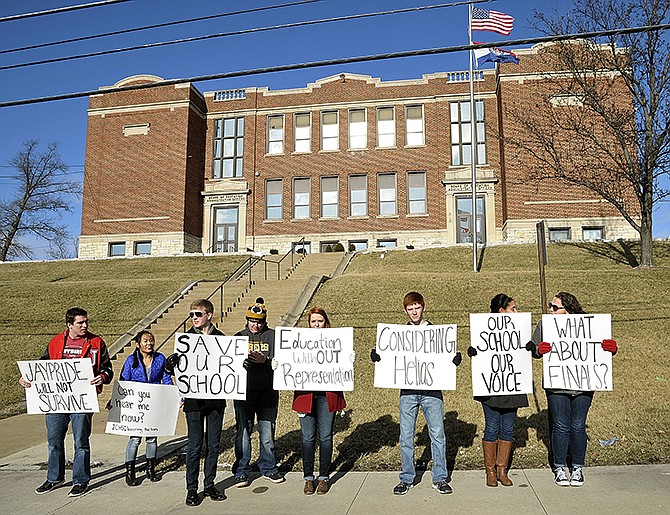Frigid temperatures didn't deter nearly 20 Jefferson City High School students from picketing Jefferson City Public Schools central office administrators on Wednesday.
Waving to passersby on Dunklin Street and holding up placards that read "Our School, Our Voice" and "Considering Helias," the teens attempted to raise awareness about a lack of student support for a new 10-block class schedule expected to be implemented this fall.
The new schedule offers several changes from the current eight-block schedule. One of the most significant is an increase in the number courses students will be expected to take.
Senior Class President George Tharp is leading the effort to ask administrators to revisit their decision. At the Board of Education's monthly meeting on Feb. 9, Tharp delivered a petition with 938 signatures he collected in two days. Although a few those names may be duplicates, he believes the petition signifies the concern many of his peers harbor about the schedule.
This week Tharp - and several other school leaders, including the presidents of the choir, orchestra, band organizations, and the speech and debate team - composed a letter to send to the district's adult leaders today.
In the letter, Tharp and his peers explain why they don't like the changes, and they propose a possible compromise. In it, they ask if the current four-block schedule could become a five-block schedule, but without the daily shifts between "A" days and "B" days.
Under the current schedule - which has been in place for about 15 years - students typically take four courses or blocks in the fall semester and four more courses or blocks in the spring semester, for a total of 32 courses in a four-year high school career.
Under the new program, students will be able to fit in 36 courses in their career, plus the four Focused Academic Success Time (FAST) classes.
For some students, FAST will serve as a study hall, while for others it will be an opportunity to get additional help from teachers or prepare for the ACT. It also will give teens a chance to get work done in a computer lab or meet in small groups.
Under the new schedule, students also will shift daily from their "A" day schedule to the "B" day schedule. So, for example, a student might take chemistry, English III, American history, art and orchestra on an "A" day. On a "B" day, he or she might be enrolled in Spanish III, Algebra II, astronomy and orchestra.
Some classes - for example, band, choir, orchestra and a few of the Advanced Placement courses - will be on both "A" and "B" days.
Over the course of a year, the primary shift is from eight classes to nine-and-a-half classes. But on a weekly basis, students will feel a shift from four classes to seven, eight, nine or even 10 in special circumstances.
"From a student's point of view, it will double my class load," Tharp said.
Colby Biesemeyer, 15 and a freshman, said he thinks the changes "do more harm than good, because school is already overwhelming."
"With more classes, it would be just horrible," he added.
Tharp and the other picketers have also complained the amount of time devoted to each class is going to shrink. Tharp said it's "already a struggle" in several AP courses to plow through the work.
"With the new schedule, it will be hard to make it through all the material," Tharp added.
Not all the students agreed with the picketers' sentiments. Madeline Mitchell, a freshman, said the new block schedule will be similar to the one students are already familiar with from middle school. And, it will help students attain more college credits from their dual-enrollment courses.
"One of the reasons I like it is I get to take a lot more classes that I couldn't take before," Mitchell said. "I'll be able to take both band and orchestra, which is a big deal for musical students."
The changes were designed by faculty members, counselors and administrators who wanted to provide students the opportunity to enroll in more classes.
Tammy Ridgeway, assistant superintendent for secondary schools, has said the changes are intended to address long-standing concerns the existing eight-blocks schedule is too rigid and prevents students from taking a wide variety of subjects.
She noted counselors are currently in the process of registering students and probably will be able to begin assigning classes by the end of next week.
Ridgeway embraced the students' willingness to protest.
"I'm an old government teacher. I'm great with it," she said. "This is why we live in the United States ... so that we can voice our opinions and concerns. And it's nice to know we have students who are passionate for a cause."
But she also said the process is rolling forward. She offered to meet with students to listen to their ideas about how the 10-block schedule might be improved.
Speaking to the teens as they stood in the 22 degree weather, Superintendent Brian Mitchell told them he would be "more than happy" to visit with them about the new schedule.
He applauded them for their creativity in drawing attention to their cause.
"You went through the appropriate process to exercise your constitutional rights to assembly and free speech," he said, and then asked if they wanted to come into his building for hot chocolate.
Asked if he thought his protest would ultimately make a difference, Tharp was less optimistic.
"I don't (have) as much hope as I'd like," he said. "We are advocating for more student voices, higher up. There should be students involved. If you're making a decision that directly affects a group of people, they should have a voice."

